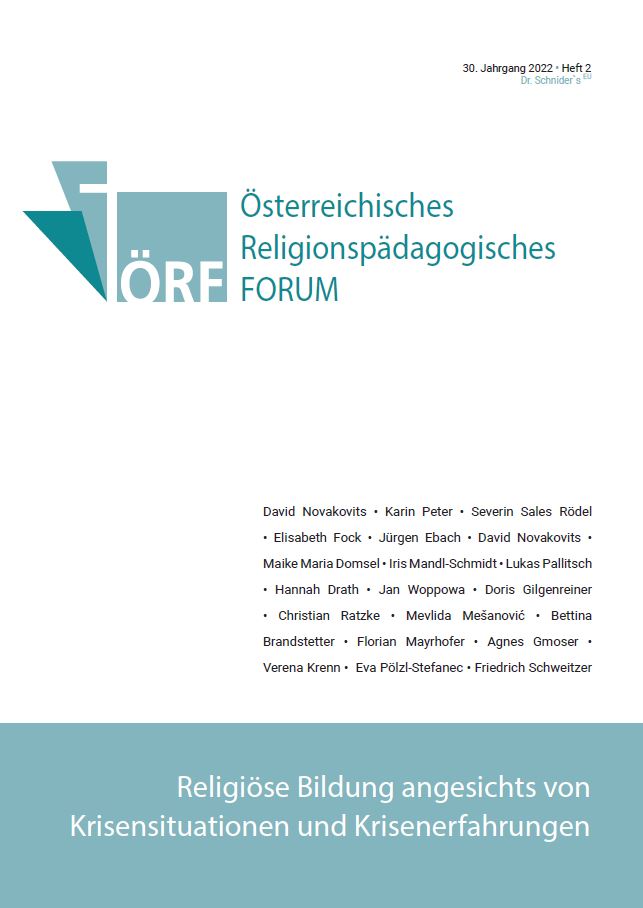Bible and language as resources in times of crisis
An interdisciplinary conversation about the Bible and language as resources in times of crisis
DOI:
https://doi.org/10.25364/10.30:2022.2.4Keywords:
rabbinic Judaism, religious education against resignation, language as resource in times of crisis, loss of language as loss of worldAbstract
In an interdisciplinary discussion, the question of ways of dealing with crises will be placed in the center. The starting point is a memory of one of the greatest catastrophes in Jewish history: the destruction of the Temple in Jerusalem in the year 70. The emergence and formation of rabbinic Judaism is interpreted as a 'way of dealing' with this experience of crisis. The possibility to live in and with scripture and to read this rabbinic turn to scripture as a response to a profound experience of crisis finds a religious pedagogical resonance in the second part of the article: the loss of structures of meaning and points of orientation, which also determines the present atmosphere of life worlds of young people, means at the same time a massive loss of language, which is perceived as an inability to express oneself and to make the world also readable and understandable. The article tries, against the temptation to reinterpret this new speechlessness as a path to salvation, to make language strong as a resource in times of crisis.
References
Arendt, Hannah: Gedanken zu Lessing. Von der Menschlichkeit in finsteren Zeiten, in: Bormuth, Matthias (Hrsg.): Hannah Arendt. Freundschaft in finsteren Zeiten – Gedanken zu Lessing, Berlin: Matthes & Seitz 2018, 39–89.
Bederna, Katrin: Every day for Future. Theologie und religiöse Bildung für Nachhaltige Entwicklung, Ostfildern: Matthias-Grünewald 22020.
Benjamin, Walter: Über den Begriff der Geschichte, in: Tiedemann, Rolf / Schweppenhäuser, Hermann (Hg.): Walter Benjamin. Gesammelte Schriften I/2, Frankfurt a.M.: Suhrkamp 1991, 691–707.
Benner, Dietrich: Einleitung, in: Ders. (Hrsg.): Erziehung – Bildung – Negativität (Zeitschrift für Pädagogik, Beiheft 49), Weinheim und Basel: Beltz Juventa 2005 (= Zeitschrift für Pädagogik, Beiheft 49), 7–24.
De Certeau, Michel: Mystische Fabel. 16. Bis 17. Jahrhundert, Berlin: Suhrkamp 2010.
Deleuze, Gilles: Proust und die Zeichen, Berlin: Merve-Verlag 1993.
Ebach, Jürgen: Die Bibel beginnt mit „b“, in: Ders.: Gott im Wort, Neukirchen-Vluyn: Neukirchener Verlag 1997.
Englert, Rudolf: Religionspädagogische Grundfragen. Anstöße zur Urteilsbildung, Stuttgart: Kohlhammer 22008.
Gärnter, Claudia: Klima, Corona und das Christentum. Religiöse Bildung für nachhaltige Entwicklung in einer verwundeten Welt, Bielefeld: transcript 2020.
Giddens, Anthony: Leben in einer posttraditionalen Gesellschaft, in: Beck, Ulrich / Giddens, Anthony / Lash, Scott (Hg.): Reflexive Modernisierung. Eine Kontroverse, Frankfurt a. M.: Suhrkamp 1996, 113–194.
Heine, Heinrich: Geständnisse [1854], in: Briegleb, Klaus (Hg.): Heinrich Heine – Sämtliche Schriften, Bd. 6/1, München: Deutscher Taschenbuch-Verlag 21985.
Heinrich, Klaus: Versuch über die Schwierigkeit nein zu sagen, Frankfurt a. M.: Stroemfeld Verlag 1982.
Hikikomori – Warum isolieren sich manche Teenager monatelang selbst?, in: https://www.kinderaerzte-im-netz.de/newsarchiv/meldung/article/hikikomori-warum-isolieren-sich-teenager-monatelang-selbst/ [abgerufen am 20.8.2022].
Horn, Eva: Zukunft als Katastrophe, Frankfurt a.M.: S. Fischer 2014.
Junge, Matthias: Scheitern. Ein unausgearbeitetes Konzept soziologischer Theoriebildung und ein Vorschlag zu seiner Konzeptionalisierung, in: De Certeau. (Hg.): Scheitern. Aspekte eines sozialen Phänomens, Wiesbaden: VS 2004, 15–33.
Kumlehn, Martina: Leben (anders) erzählen. Narrative Identität als religionspädagogische Bildungsaufgabe, in: Zeitschrift für Pädagogik und Theologie 64/2 (2012) 135–145.
Lübbe, Hermann: Religion nach der Aufklärung, Graz: Styria 1986.
Peukert, Helmut: Bildung in gesellschaftlicher Transformation, Paderborn: Ferdinand Schöningh 2015.
Recalcati, Massimo: Elogio del fallimento. Conversazioni su anoressie e disagio della giovinezza, Trento: Erickson 2011.
Rilke, Rainer Maria: Gesammelte Gedichte, München: Goldmann 22006.
Rosa, Hartmut: Resonanz. Eine Soziologie der Weltbeziehung, Berlin: Suhrkamp 2019.
Strehle, Samuel: Zur Aktualität von Jean Baudrillard. Einleitung in sein Werk, Wiesbaden: VS 2012.
Streib, Heinz: Erzählte Zeit als Ermöglichung von Identität. Paul Ricoeurs Begriff der narrativen Identität und seine Implikationen für die religionspädagogische Rede von Identität und Bildung, in: Georgi, Dieter / Moxter, Michael / Heimbrock, Hans-Günter (Hg.): Religion und die Gestaltung der Zeit, Weinheim: Kok 1994, 181–198.
Turkle, Sherry: La conversazione necessaria. La forza del dialogo nell’era digitale, Turin: Einaudi 2015.
Ulrich, Bernd: Sieben auf einen Streich, in: Die ZEIT 13 (24.3.2022), 4.

